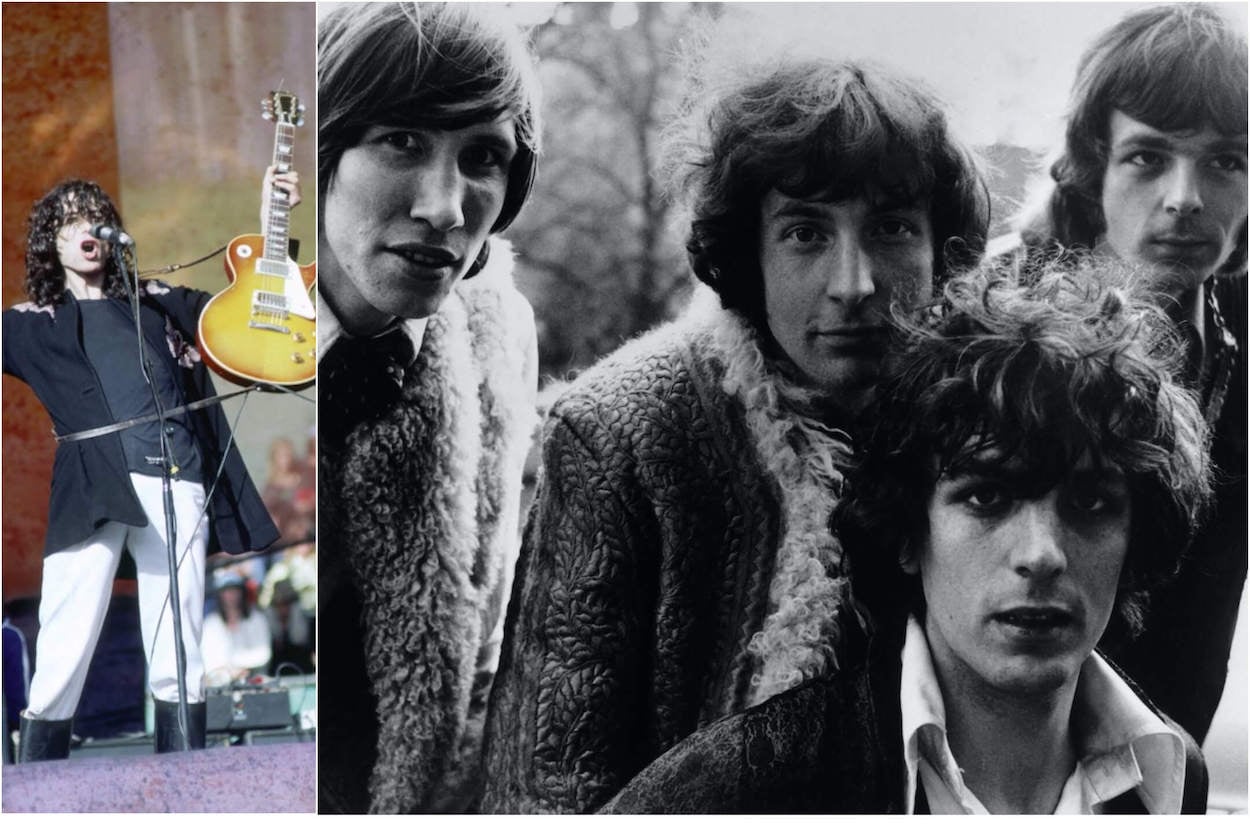
Jimmy Page Praised Pink Floyd’s Syd Barrett in Just 7 Words
Jimmy Page and Led Zeppelin remain classic rock juggernauts decades after their apex. Page’s best guitar solos remain iconic, and the band’s songs are still all-time greats. Even though he was focused on getting his band off the ground in the late 1960s, the guitarist knew about the music scene around him. One of the contemporaries was Pink Floyd, and Page praised to their first guitarist, Syd Barrett, with just seven words before Barrett faded into obscurity.

Jimmy Page praised Pink Floyd’s Syd Barrett: ‘You can really feel the genius there’
Pink Floyd and Led Zeppelin were newcomers on the London music scene in the later 1960s. The Beatles and Rolling Stones were well-established bands at the time, but the newer bands forming in their wakes became just as impactful.
Pink Floyd’s rise included three distinct eras: The Barrett-led rise, the band searching to find their way after his mental breakdown, and their rise to fame in the 1970s. Had Barrett not receded from reality, Pink Floyd’s career trajectory would have been much different.
Per Light & Shade: Conversations With Jimmy Page author Brad Tolinski, Page praised Barrett by comparing him to Jimi Hendrix:
“Syd Barrett’s writing with the early Pink Floyd was inspirational. Nothing sounded like Barrett before Pink Floyd’s first album. There were so many ideas and so many positive statements. You can really feel the genius there, and it was tragic that he fell apart. Both he and Jimi Hendrix had a futuristic vision in a sense.”
Jimmy Page praises Pink Floyd’s Syd Barrett
Page’s high esteem for Barrett comes down to seven words: “You can really feel the genius there.”
While recording their debut album, The Piper at the Gates of Dawn, Pink Floyd members crossed paths with The Beatles. Paul McCartney sensed Pink Floyd’s potential and accurately predicted the band’s success. Page saw it in Barrett, too.
We know where Page was coming from regarding Barrett’s genius
The psychedelic scene in swinging London gained a foothold with The Beatles’ Rubber Soul in 1965, bloomed with the Fab Four’s Revolver in 1966, and pollinated across the landscape soon after.
Procul Harum’s “A Whiter Shade of Pale” hit in early 1967. The Beatles Sgt. Pepper’s Lonely Hearts Club followed in May 1967. But as Page said, Pink Floyd’s Piper, which hit stores in August 1967, was unlike anything of its era.
Barrett wrote most of the songs on Floyd’s debut. Saying he charted his own course would be putting it lightly. The ethereal and pastoral “Chapter 24” segues from verse to chorus without a bridge. The lengthy and spacey instrumental section in the middle of “Astronomy Domine” predated Page’s behind-the-scenes work on “Whole Lotta Love.” And the Songs such as “Pow R. Toc H.” and “Interstellar Overdrive” gave a dark edge to London’s summer of love. Yet for every experimental move, Barrett balanced it with relatively straightforward (albeit acid-drenched) pop tunes such as “The Gnome,” “Bike,” and “Flaming.”
Barrett’s unique perspective and songwriting approach shined through on The Piper at the Gates of Dawn, yet the music was still accessible and catchy.
As Page alluded to, Barrett’s genius didn’t last. Pink Floyd replaced him in early 1968 after his erratic behavior threatened to sabotage the band. Still, on one album, his songwriting pointed toward Led Zeppelin’s “Whole Lotta Love” musical freakout, the muscular space rock of Hawkwind, the heavier psychedelia the Beatles pursued on Magical Mystery Tour and Yellow Submarine, and the darker edge that found its way into mainstream music in the 1970s (such as Pink Floyd’s Animals and The Wall).
Page praised Syd Barrett’s genius, which shined through on the band’s debut. It makes sense. Floyd’s main songwriter did things on his terms but still managed to create catchy songs that predicted the next decade of mainstream music. Barrett’s genius flamed out quickly, but Page knew he was lucky to see it burn at all.
Led Zeppelin and Pink Floyd found success in their own way
Pink Floyd got its name from two blues musicians — Pink Anderson and Floyd Council — but their music in every phase of their career hardly indicated those ties. Led Zeppelin’s songs followed their blues inspirations so closely that they faced copyright lawsuits — which Page blamed on singer Robert Plant.
Still, both bands found success with their approaches. By the time of their third album in 1970, Zep had abandoned their blues mimicry for a sound all their own. Every studio album they released in the 1970s hit No. 1 in the U.S. except for Led Zeppelin IV.
Pink Floyd needed several years to establish an identity without Barrett’s genius leading the way. But like Led Zeppelin, they achieved massive success in the 1970s. The Dark Side of the Moon (1973), Wish You Were Here (1975), and The Wall (1979) all went to No. 1 on the Billboard charts.
Game recognizes game, and the innovative Jimmy Page praised Syd Barrett’s genius-level work with Pink Floyd. Though his star faded, Barrett lit the way for much of the music that followed, and Page realized he was lucky enough to see it.
For more on the entertainment world and exclusive interviews, subscribe to Showbiz Cheat Sheet’s YouTube channel.


